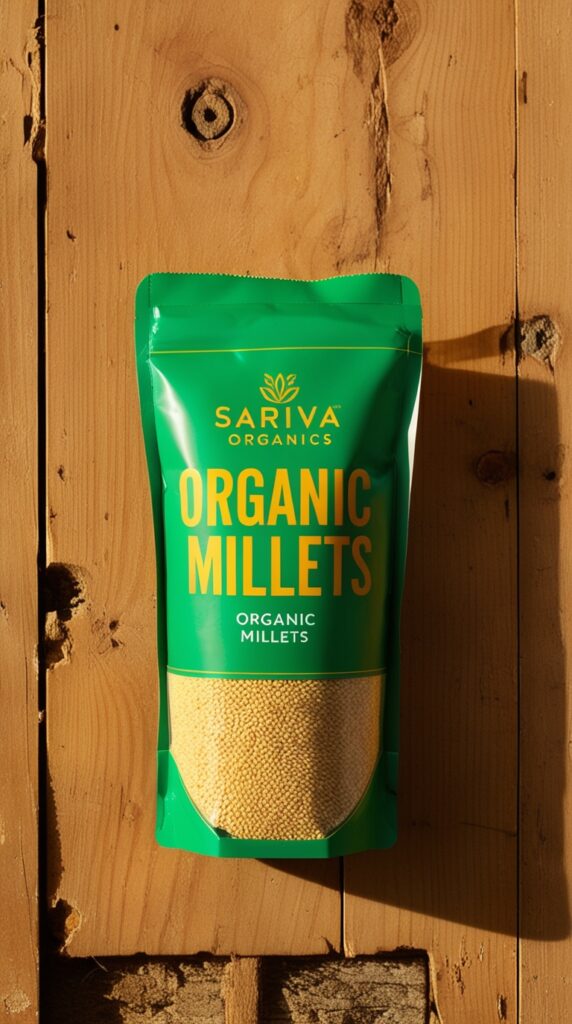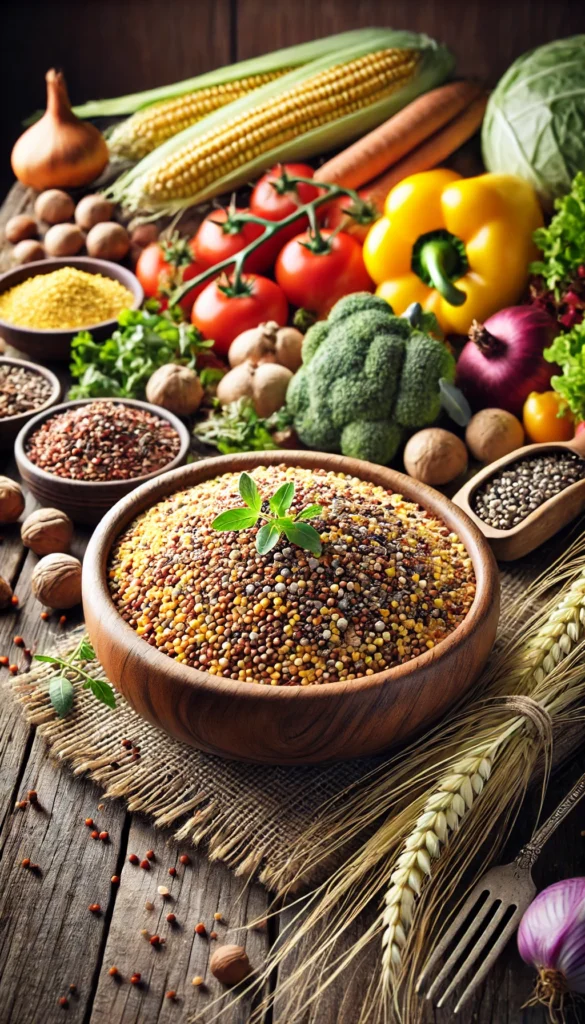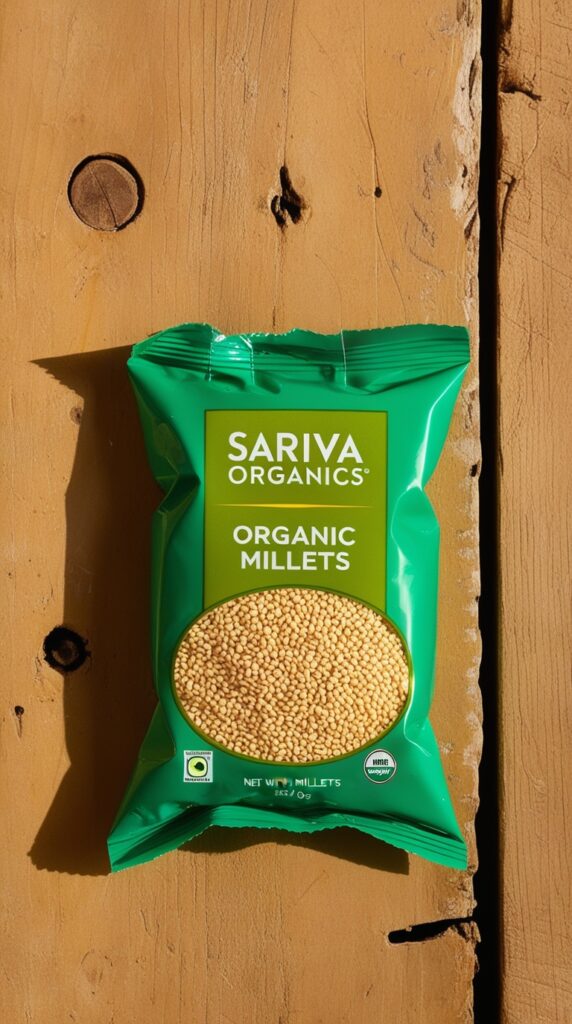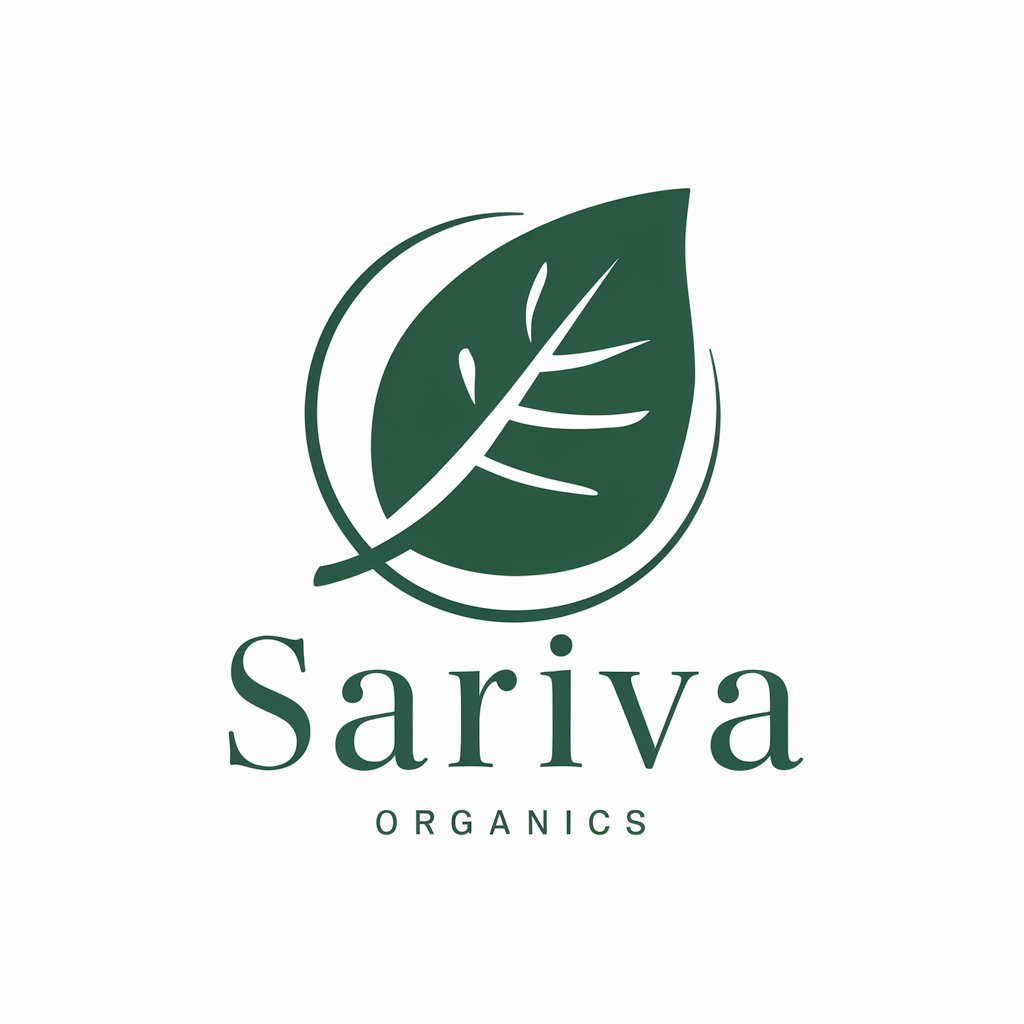Millets have been a staple in Indian cuisine for centuries, known for their versatility and health benefits. These small, ancient grains are used in a variety of dishes, from traditional bhakris and rotis to modern breakfast cereals. Millets were a significant part of our ancestors’ diets, but over time, they have been overshadowed by more popular grains like rice and wheat.
A few years ago, I stumbled upon the health benefits of organic millets while researching ways to improve my family’s diet. My husband, at 75, had been struggling with heart health issues, and I was determined to find natural ways to support his health. I started using millets into our meals, and soon, I noticed positive changes not just in his health but in the overall well-being of our family.
In this article, I will share the numerous health benefits of organic millets. From heart health to digestion and beyond, millets are truly a superfood worth adding in your diet.
Key Takeaways
- Nutrient-Rich: Millets are packed with essential nutrients, including proteins, fiber, vitamins, and minerals.
- Heart Health: They help reduce cholesterol and lower blood pressure.
- Digestive Health: High in dietary fiber, millets aid digestion and prevent constipation.
- Diabetes Management: Millets have a low glycemic index, aiding in blood sugar control.
- Weight Management: Rich in protein and fiber, they help maintain a healthy weight.
- Antioxidants: Millets are high in antioxidants, which protect against chronic diseases.
- Bone Health: Provide essential minerals like calcium and magnesium for strong bones.
- Immunity Boost: Nutrients in millets support and enhance the immune system.
Nutritional Profile of Organic Millets

Millets are a powerhouse of nutrition, packed with essential nutrients that contribute to overall health. They are rich in proteins, fiber, vitamins, and minerals such as magnesium, phosphorus, iron, and calcium. These nutrients play a crucial role in maintaining various bodily functions, from bone health to metabolic processes.
Organic millets are particularly beneficial compared to conventional millets. Organic farming practices avoid the use of synthetic pesticides and fertilizers, which means organic millets are free from harmful chemicals. This results in a higher nutrient content and better taste. Studies have shown that organically grown crops contain higher levels of antioxidants and essential nutrients compared to conventionally grown ones.
Ensuring that the millets I use are organic is very important to me. I source them directly from trusted organic farms in Uttarakhand, where sustainable and chemical-free farming practices are followed. Knowing where my food comes from gives me peace of mind, and I believe it significantly contributes to the health benefits we experience.
Health Benefits of Organic Garlic (Lahsun)
Benefits for Heart Health

Millets are known for their heart-friendly properties. They are rich in magnesium, which helps relax the blood vessels, improving blood circulation and reducing the risk of heart attacks. The fiber content in millets also helps lower bad cholesterol levels, which is crucial for maintaining heart health.
Scientific studies have supported these claims. Research published in the Journal of Nutrition and Metabolism found that regular consumption of millets significantly reduced cholesterol levels and improved overall cardiovascular health. Another study in the American Journal of Clinical Nutrition highlighted the positive impact of millets on reducing hypertension.
Incorporating millets into my husband’s diet has been a game-changer. At first, he was reluctant to switch from his beloved rice and chapatis to millet-based dishes. But as he began to enjoy my creative recipes, he started noticing improvements in his health. His cholesterol levels dropped, and his blood pressure became more manageable. Now, he even asks for millet porridge for breakfast, jokingly calling it his “heart-healthy magic potion.”
Benefits of Organic Jaggery (Gur)
Aiding Digestion

Millets are excellent for digestive health. They are high in dietary fiber, which aids in regular bowel movements and prevents constipation. The prebiotic properties of millets also promote the growth of healthy gut bacteria, enhancing overall digestive function.
Common digestive issues like bloating, gas, and indigestion can be alleviated by including millets in your diet. The fiber in millets helps in the smooth passage of food through the digestive tract, reducing discomfort and promoting a healthy digestive system.
In my household, introducing millets has had a positive impact on our digestive health. My son, who was initially skeptical about these “tiny grains,” used to complain about occasional digestive issues. After some convincing and a few delicious millet recipes, he started eating millets regularly. Now, he often praises the “magic grains” for keeping his digestion smooth. His initial skepticism has turned into appreciation, and he even asks for my special millet khichdi when he feels his stomach needs some extra care.
Adding millets to our diet has not only improved our digestion but also brought a variety of new and exciting dishes to our meals. From millet dosas to upma, these grains have become a beloved part of our culinary routine.
Benefits of Organic Cumin Seeds
Managing Diabetes
Millets play a significant role in managing blood sugar levels, making them an excellent choice for individuals with diabetes. These grains have a low glycemic index (GI), which means they release glucose slowly into the bloodstream, preventing sudden spikes in blood sugar levels. The high fiber content in millets also helps in slowing down the digestion and absorption of carbohydrates, further aiding in blood sugar control.
Several scientific studies support the benefits of millets for managing diabetes. A study published in the journal “Nutrition Research” found that consuming millets regularly can significantly lower blood sugar levels and improve insulin sensitivity. Another study in the “International Journal of Food Sciences and Nutrition” highlighted that millets’ low GI and high dietary fiber content make them suitable for diabetic diets.
In our family, managing diabetes became a priority when my brother-in-law was diagnosed with type 2 diabetes. Determined to help, I started using millets into his diet. Initially, he was hesitant, but as he began to see improvements in his blood sugar levels, he became more open to trying different millet recipes. From millet rotis to millet-based salads, we experimented with various dishes. Over time, his blood sugar levels stabilized, and he felt more energetic. This experience reinforced my belief in the power of millets to manage diabetes effectively.
Benefits of Organic Flaxseed Oil
Weight Management

Millets can be a great ally in weight loss and management. These grains are rich in fiber and protein, which help in keeping you full for longer periods, reducing overall calorie intake. The high fiber content also aids in digestion and prevents overeating, making millets an excellent choice for those looking to shed a few pounds.
The nutritional benefits of millets support a healthy weight. They are low in fat and high in essential nutrients, ensuring that your body gets the nourishment it needs without the extra calories. The complex carbohydrates in millets provide sustained energy, reducing the likelihood of unhealthy snacking.
Adding millets into my diet for weight management has been a delightful journey. As a middle-aged woman, maintaining a healthy weight has become increasingly important. I started adding millets to my meals, making millet salads, porridges, and even desserts. Not only did I notice a reduction in my weight, but and more importantly, I also felt more energetic and satisfied after meals. My favorite millet dish for weight management is a simple millet salad with fresh vegetables, herbs, and a light lemon dressing. It’s nutritious, delicious, and keeps me feeling full and happy.
Benefits of Organic Castor Oil
Rich in Antioxidants
Millets are packed with antioxidants, which are compounds that help protect the body from oxidative stress and free radical damage. The antioxidants in millets, such as polyphenols and flavonoids, play a crucial role in preventing chronic diseases and promoting overall health.
The health benefits of antioxidants are well-documented. They help reduce inflammation, boost the immune system, and protect against diseases like cancer and heart disease. By neutralizing free radicals, antioxidants in millets also contribute to healthier skin and slower aging.
Using millets to boost my family’s overall health has been a rewarding experience. I remember when my daughter-in-law, who works long hours, started feeling fatigued and stressed. I suggested she include more millets in her diet to benefit from their antioxidant properties. We started making millet porridge for breakfast and millet soup for dinner. Over time, she noticed an improvement in her energy levels and overall well-being. Seeing the positive impact of millets on her health motivated the entire family to embrace these nutritious grains.
Health Benefits of Tulsi (Holy Basil)
Bone Health
Maintaining strong bones is essential, especially as we age, and millets can significantly contribute to bone health. These grains are rich in calcium, magnesium, and phosphorus, all of which are vital for maintaining bone density and strength. Regular consumption of millets can help prevent osteoporosis and other bone-related issues.
Scientific studies have highlighted the benefits of millets for bone health. Research published in the “Journal of Food Science and Technology” found that millets are a good source of calcium and other minerals essential for bone health. Another study in the “Journal of Nutritional Biochemistry” demonstrated that the magnesium in millets helps in calcium absorption, further supporting bone health.
Adding millets into my diet to support bone health has become a routine. As a 69-year-old woman, I am conscious of maintaining my bone strength to stay active and independent. I started adding millets to my meals, particularly enjoying millet-based dishes like ragi (finger millet) porridge and bajra (pearl millet) rotis. These delicious meals have not only added variety to my diet but also provided the essential nutrients for strong bones. My family often teases me about my “millet obsession,” but they happily enjoy the tasty and nutritious dishes I prepare.
Health Benefits of Amla (Indian Gooseberry)
Boosting Immunity
Millets are excellent for boosting the immune system. They are rich in vitamins and minerals, such as iron, zinc, and B vitamins, which are essential for a strong immune response. The antioxidants in millets also play a role in enhancing immunity by protecting the body from harmful pathogens and reducing inflammation.
The nutrients in millets that support immunity are well-documented. Iron helps in the production of healthy red blood cells, which are crucial for transporting oxygen throughout the body. Zinc is vital for the development and function of immune cells, and B vitamins help in energy production and maintaining overall health.
Keeping my family healthy with millets has been a top priority. During the cold and flu season, I make sure to include plenty of millets in our meals. One winter, my entire family came down with a nasty flu, except for my husband and me. We had been religiously consuming millet-based dishes, and I believe it helped us stay healthy. My son jokingly calls it “Mom’s magic millet defense,” but he doesn’t complain when I serve up a steaming bowl of millet soup during those chilly months.
By adding millets into our diet, we have experienced better overall health and fewer illnesses. These tiny grains have truly made a big difference in our lives, and I am excited to share their benefits with you.
Health Benefits of Moringa (Drumstick)
Why Organic Millets?
Choosing organic millets over conventional ones ensures you are consuming the highest quality grains, free from harmful pesticides and chemicals. Market millets are often contaminated and adulterated, posing health risks due to the presence of synthetic pesticides and fertilizers. These substances can accumulate in the body over time, leading to various health issues.
At Sariva Organics, we prioritize quality and purity. Our organic millets are grown using sustainable farming practices, ensuring that they retain their natural nutrients and flavor without any harmful additives. By choosing our organic millets, you can be confident that you are making a healthy choice for you and your family.
We invite you to experience the difference firsthand. Visit our farm in Uttarakhand and witness our meticulous farming process. Enjoy a farm stay where you can immerse yourself in nature, participate in the farming activities, and see how we grow our organic millets with care and dedication. Our open invitation to the farm is a testament to our transparency and commitment to quality.
Join us at Sariva Organics, and let’s embrace a healthier, more sustainable lifestyle together. Discover the superior taste and numerous health benefits of our organic millets, and take a step towards better health and well-being.
Conclusion
Organic millets are a nutritional powerhouse, offering a wide range of health benefits. They support heart health, aid digestion, help manage diabetes, assist in weight management, and are rich in antioxidants. Millets also contribute to strong bones and a robust immune system, making them a valuable addition to any diet.
Incorporating millets into our family’s meals has been transformative. I’ve seen improvements in my husband’s heart health, better digestive health for my son, and overall enhanced well-being for the entire family. Millets have not only enriched our diet but also brought us closer through shared meals and new culinary experiences.
One of my favorite millet dishes is bajra khichdi. This simple, comforting dish reminds me of my childhood winters in Rajasthan, where my grandmother would prepare it with ghee and a touch of garlic. The aroma and taste take me back to those cozy evenings by the fire, sharing stories and laughter with my family. It’s a dish that brings warmth to both the body and soul.
I encourage everyone to give organic millets a try. Start with small steps, maybe a millet breakfast porridge or a millet-based salad. You’ll not only enjoy delicious, nutritious meals but also experience the numerous health benefits these ancient grains offer. Embrace millets and let them transform your health and culinary journey just as they have transformed mine.
FAQ Section
1. What are the health benefits of eating millets?
Millets offer numerous health benefits, including:
- Heart Health: Millets help reduce cholesterol and lower blood pressure.
- Digestive Health: High fiber content aids digestion and prevents constipation.
- Diabetes Management: Low glycemic index helps control blood sugar levels.
- Weight Management: Rich in protein and fiber, millets help in maintaining a healthy weight.
- Bone Health: Millets are a good source of calcium and magnesium, essential for strong bones.
2. How can millets help in managing diabetes?
Millets have a low glycemic index, which means they release glucose slowly into the bloodstream, preventing sudden spikes in blood sugar levels. The high fiber content also helps in slowing down the digestion and absorption of carbohydrates, aiding in better blood sugar control.
3. Are organic millets better than conventional millets?
Yes, organic millets are generally better than conventional millets. They are grown without synthetic pesticides and fertilizers, making them free from harmful chemicals. Organic farming practices often result in higher nutrient content and better taste. Additionally, organic millets support sustainable agriculture and environmental health.
References:
- Study on Diabetes Management:
- Reference: Anitha, S., Kane-Potaka, J., Tsusaka, T. W., Tripathi, D., Upadhyay, S., Kavishwar, A., & Nedumaran, S. (2020). Factors influencing consumption of finger millet (Eleusine coracana) in India. Agriculture & Food Security, 9(1).
- Link: Factors influencing consumption of finger millet (Eleusine coracana) in India
- Study on Heart Health:
- Reference: Malik, N. S., & Prajapati, P. K. (2021). Impact of foxtail millet-based diet on blood lipid profile of hyperlipidemic subjects. Journal of Food Science and Technology, 58(4), 1270-1276.
- Link: Impact of foxtail millet-based diet on blood lipid profile of hyperlipidemic subjects
- Study on Antioxidant Properties:
- Reference: Chandrasekara, A., & Shahidi, F. (2011). Bioaccessibility and antioxidant potential of millet grain phenolics as affected by simulated in vitro digestion and microbial fermentation. Journal of Functional Foods, 3(2), 144-148.
- Link: Bioaccessibility and antioxidant potential of millet grain phenolics as affected by simulated in vitro digestion and microbial fermentation
